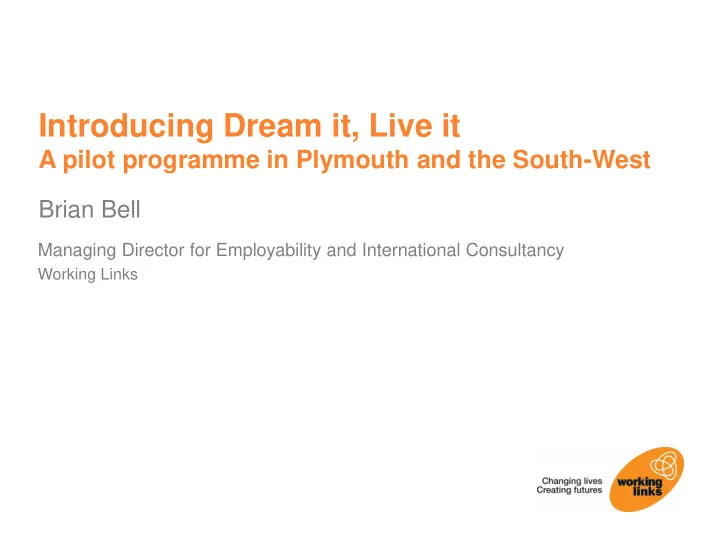

Introducing Dream it, Live it A pilot programme in Plymouth and the South-West Brian Bell Managing Director for Employability and International Consultancy Working Links
Think bigger, aim higher, and get ahead. Helping young people to progress in employment and self-employment.
Success story
Success story: Chris Chris was working as a cleaner on the Torpoint Ferry, Plymouth. With his mentor, he discussed his experience and shared his passion for music. He also said that he would be happy to move away from Plymouth. After support with job searching, Chris applied for and got a job as a singer in Greece. With a wage increase, Chris is now in a financially stable position with reduced living costs. He is thrilled to be living out his dream.
Success story: Chris Chris was working as a cleaner on the Torpoint Ferry, Plymouth. With his mentor, he discussed his “ experience and shared his passion for music. He also said that he would be Without Kelly and happy to move away from Plymouth. the team’s help I After support with job searching, Chris would never have applied for and got a job as a singer in had this fantastic Greece. With a wage increase, Chris is ” opportunity. now in a financially stable position with reduced living costs. He is thrilled to be living out his dream.
A wage progression pilot
Summary of Dream It, Live It • Supporting 1000 young people to boost earning and productivity. • Initially for 18-24 year olds that secured work through the Work Programme, then expanded to older age groups. • Key milestones: engagement; start and completion of activity; wage progression. • Tailored approach for all customers. • Support with career and skills.
What did we learn?
Key lessons learnt • Securing engagement – contact – hooks – most likely to say no? • Type of support wanted: – new/better job (52%) – Training options (20%) – Debt/housing (11%) – Confidence (6%) • ongoing flexible support.
Key lessons learnt • Wage progression can mean: - More hours or a pay rise - A new job - Self-employment • Aspirational differences: rural/urban • Relationships with employers
Some interim outcomes
Our interim findings • The project has been extended by the Cabinet Office • Two thirds are engaging in a progression • Activity. • Two fifths have completed activities. • 12% have achieved a wage progression so far. • Two-thirds said they could identify positive outcomes . • Nearly 90% anticipated positive futures . • 95% would recommend the programme to a friend.
What should JobCentre Plus consider if they are to deliver this service? • A refreshed brand. • Empowerment • Employers • Contact issues.
What is the problem we are trying to fix? • Reduce benefit costs under Universal Credit? • A higher wage society? • Greater job security? • Sustainable employment?
Recommend
More recommend